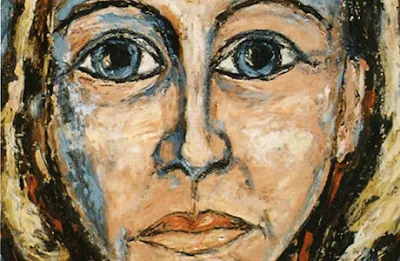Recently discovered the work of Anna Kavan. Born Helen Woods, in Cannes, France. Kavan was the main character in her novel Let Me Alone.
A lifelong heroin addict she adopted the name after a spell in asylums in Switzerland and England.
As well as being a writer, she was also a talented painter and interior designer.
Her early writings were fairly conventional, but after changing her name, her works took on a more transformative air. Apparently she also used to daily take amphetimines whilst writing.
Her books seem to weave between a fevered imagination that finds their way into her often unclassifiable books, that are filled with hauntingly surreal magical landscapes. They contain an otherworldly strangeness that I like a lot.
She was to become an influence on writers as diverse as Doris Lessing, J.G. Ballard, Anais Nin and Jean Rhys.
She was sadly found dead in her London home clutching a syringe. If you have not read her previously, I strongly recommend you checking her out.
Stark Vision - detail from self-portrait by Anna Kavan
The following is an extract from her 1947 book ( a classic in my humble opinion) Sleep Has His house.
' TRUTH, it's everything. The man who said, What is truth? certainly touched on a big subject. The truth of the matter is that there's far too much truth in the world. The world, from whichever you observe it, is altogether too full of truth. It isn't easy to recognise this truth in the first place, but it's impossible ever to ignore it once it's been grasped.
Every single possibility or impossibility is true somewhere to someone at some time. It's true that the earth is as round as an orange and as flat as a pankcake. It's true that the wicked island goddess Ragda is a good goddess when she takes off her mask. Black magic on top, white magic underneath. That proves that black's whit, doesn't it?
It's true that the idea odf America is a bright and shining thing in the mind. It's true that the idea of America is a crude and brutal land inhabited by adolescents and gangsters.
Defeatism's true; war's true. So's idealism and the hope of a better society. You pay your money and you take your choice. Civilisation's gone down the drain. Utopia's just round the corner.
It's true that civilization marches on: atomic energy plus universal war. The Hallelujah Chorus from Handel's Messiah; H.M.V, recording. That's a truth, although universal war. There's the truth that you go to bed with and the truth that wakes you up at three o'clock in the morning when the tigers are jumping up and down on the roof and eternity is flapping at the earth like somebody shaking a rug. the truth of loving and hating, being an extrovert and an introvert, a success and a failure, travelling all over the world, living your whole life in one place, having security, accepting all risks. Then there's the truth that you find with the dirty glasses stacked in the sink. That's a different sort of truth.
Books continue to be written in one truth and read in another. The radio announces various kinds of truth to suit every listener. Atomic warfare is true and so is the Sermon ofon the Mount. Truth is everywhere, in eveything, all the time. That's why it's true. It's true that all this is obvious and has been said often before. That truth's as true as any other truth too.'














